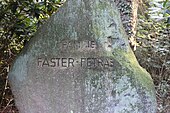Oscar Fetrás
Oscar Fetrás , born Otto Friedrich Faster (born February 16, 1854 in Hamburg ; † January 10, 1931 there ), was a German composer and conductor .
Life
Fetrás was born as the son of the Hamburg publisher of a stock market magazine, Matthias Faster. The paternal line comes from Bützfleth - today Stade near Hamburg. The grandfather Captain Faster from Bützfleth was killed when his ship Ceres sank in 1828. His mother Amalie Margarethe, née Decker, comes from an old family on the North Sea island of Sylt , to which the freedom fighter Uwe Jens Lornsen belonged. After a musical training and a commercial apprenticeship, Otto Faster was authorized signatory of the Hamburg shipping company Carl Laisz. (Flying P-Liner)
In addition to this job, Otto Faster ran a small waltz band that played in Hamburg in the evenings and on weekends.
Otto Faster chose the anagram Fetras from Faster as his stage name and changed his first name to Oscar. From 1883 he was only active as a musician. He devoted himself exclusively to dance and light music.
Oscar Fetrás became world famous with his waltz Mondnacht auf der Alster , composed in 1888 . He received numerous awards, including from the German Kaiser . Hamburg's economy also awarded him a prize, a valuable bronze statue of the Roman god Mercury by the French sculptor Marius Montagne. This statue is the only remaining item owned by Oscar Fetrás. Everything else was lost in bombing raids in the Second World War in the Uhlenhorster Fährhaus , a popular restaurant and ballroom in Hamburg-Uhlenhorst . From 1884 Fetrás played here for many years as an orchestra conductor with his own band. With around 300 works, including waltzes (e.g. Uhlenhorster children , Veilchen am weg , Harv'stehuder swallows ), marches ( only fest , Wandervögel , Freikugeln ) and potpourris ( Tyrol in song and dance , memories of Joseph Strauss , Operetta Revue ), Fetrás became the most respected composer of the light muse from Hamburg. He was a member of the Société des Auteurs in Paris.
Fetrás remained unmarried throughout her life. He died in Hamburg in 1931. His memory is almost forgotten. In Hamburg- Meiendorf the Fetrasweg is named after him. The grave of honor of the artist, who was world-famous in his time, is located in Hamburg's Ohlsdorf cemetery . The life and work of Oscar Fetrá was researched and put down by Friedhelm Kuhlmann in the extensive work There was more than the moonlit night on the Alster .
Web links
- Sheet music and sound carriers by Oscar Fetrás in the catalog of the German National Library
- Biography on the website of the Johann Strauss Society of Great Britain
- Sheet music and audio files by Oscar Fetrás in the International Music Score Library Project
Individual evidence
- ^ Gerhard Renner: The bequests in the Vienna City and State Library: a directory. Vienna City and State Library, 1993, p. 45.
- ↑ a b c d Herrmann AL Degener: Who is it: Zeitgenossenlexikon, containing biographies and bibliographies. Degener, 9th edition, Berlin 1928, p. 393.
- ^ Gisela Jaacks : Faces and Personalities: inventory catalog of the portrait collection in the Museum of Hamburg History. Museum of Hamburg History, Hamburg 1992, part 1, p. 278.
- ↑ Oscar Fetrás (1854-1931) johann-strauss.org.uk, accessed on November 16, 2012.
- ^ Prominent friedhof-hamburg.de, accessed on November 16, 2012.
| personal data | |
|---|---|
| SURNAME | Fetrás, Oscar |
| ALTERNATIVE NAMES | Faster, Otto Friedrich (birth name) |
| BRIEF DESCRIPTION | German composer and conductor |
| DATE OF BIRTH | February 16, 1854 |
| PLACE OF BIRTH | Hamburg |
| DATE OF DEATH | January 10, 1931 |
| Place of death | Hamburg |
